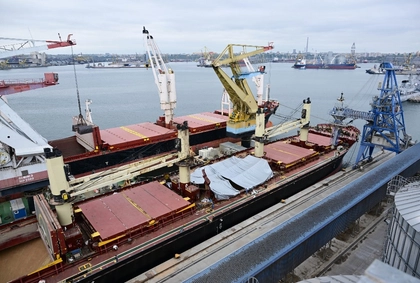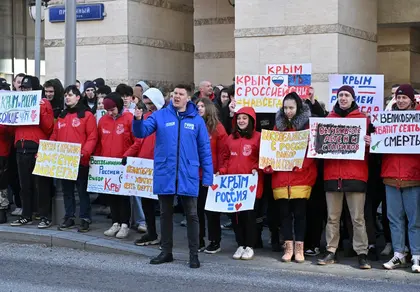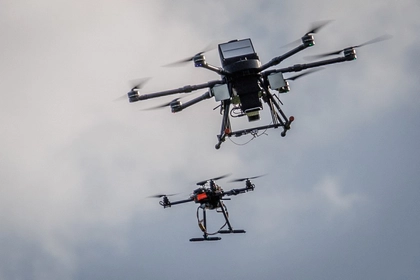Various polls on how Russians perceive the war in Ukraine, conducted at the end of 2023, show a schizophrenic Russia that supports the war and peace negotiations simultaneously.
But low enlistment numbers, coupled with the dislike for mobilization, might be an indicator of indifference towards the war – Russians might support the war, but they don’t want to sacrifice themselves for it.
JOIN US ON TELEGRAM
Follow our coverage of the war on the @Kyivpost_official.
Polls in Russia are notoriously non-representative due to the prevalence of political censorship and there is cause to take any polls coming from there with a grain of salt.
Bearing that in mind, the latest polls might hint at dissatisfaction with the war ahead of the Russian presidential election in March.
Polls show many Russians support the war
Three polls shared a common finding – a huge portion of Russians appear to support the war. Or, at least, Russia’s military actions in Ukraine.
Russia-based Levada Center reported that in its November poll, 74 percent of the 1,625 people it interviewed “support the actions of the Russian Armed Forces in Ukraine,” with a growing number of respondents saying the war’s going smoothly (66 percent in November versus 55 percent in June) for Russia.

The US-based University of Chicago's National Opinion Research Center (NORC) found that 63 percent of respondents supported Russia’s invasion in its own November poll.

Rising War Insurance Costs Threaten Ukrainian Exports
In October, the Chronicles research project found that 52 percent of respondents said they supported it. However, the Russian opposition-initiated project concluded that many respondents likely chose the answers they gave out of fear of government repercussions.
The Chronicles and NORC polls were by phone while the one by Levada Center was in person.
The level of support varies
The different methodologies employed by the polls have produced varying results, but most have demonstrated a decrease in pro-war fanatics inside Russia.
Thirty-nine percent of those interviewed – down from 45 percent in October – said they supported the actions of the Russian military in Levada’s poll without reservations and answered with a “definitely” in their response.
Chronicles placed the number of “consistent” supporters – that is, those who not only support the war, but also believe army expenses should be a priority, and who would oppose withdrawing from Ukraine without reaching Russian President Vladimir Putin’s goals – at only 12 percent of responders, down from 22 percent in February.
And NORC found that just under half, 45 percent, “strongly” support the war.
Only 10 to 15 percent of the population supports “war parties” like that of Igor “Strelkov” Girkin, said Valery Fedorov, the director of Kremlin-loyal pollster WCIOM and an official advisor to the first deputy chairman of Russia’s presidential administration.

“The majority of Russians do not want to seize Kyiv or Odesa,” he said. “If it was up to them whether to start the special military operation, they probably would not have done it.”
What do Russians think about peace negotiations?
The Levada poll indicated that 57 percent of Russians “believe that peace negotiations should begin.”
Fifty-seven percent is a record-high, only matching the level in October 2022, after the Kremlin declared a partial mobilization of military reservists.
Of those interviewed, 24 percent said Russia needed to negotiate peace, while 33 percent would simply “prefer” negotiations.
Meanwhile, Chronicles reported that 49 percent of its respondents “didn’t express support for the war,” and 40 percent “would support the decision to withdraw without reaching goals of the war.”
Neither Levada nor Chronicles asked Russians their thoughts on unconditionally withdrawing from Ukraine, including occupied territories.
A schizophrenic Russia
The contradictory results, which simultaneously demonstrated high support for the war and a desire for negotiations, could be interpreted as a sign of indifference – “So long the war does not affect me, who cares?”
This is apparent in Russian presidential candidate Boris Nadezhdin’s comments on the lack of support for military wives.
“Some Russians try to brush these women off. ‘Since the trouble did not affect me personally, it means there is no need to worry. Their husbands are their problem,” he said.
Coupled with the video that showed a pro-war Russian’s reluctance to be forcibly drafted when he was mistaken for an anti-war protestor and detained, and how a number of Russians openly displayed their support for the war while abroad and safe from being mobilized, it’s apparent that a huge percentage of Russians believe in the war, just not in fighting it themselves.
On the other hand, the desire for peace negotiations could also stem from economic hardships caused by the war, where 44 percent of respondents reported a decrease in family income in the Chronicles poll.
The economic hardship was evident through rising food prices, where falling oil prices and the shift of government spending to military manufacturing have driven egg prices in Russia up by over 37 percent in some cities in December.

While the US-based NORC poll did not cover opinions on potential peace talks, it asked those who are opposed to the war why did they so, where 31 percent cited “loss of life, threat to life” as the reason, followed by 18 percent who cited “pacifism, cannot be fought.”
NORC poll respondents seem to have a stronger pro-war stance, with those supporting it citing the fight against the US and NATO as the main reason, followed by a series of claims on purported Ukrainian far-right ideologies and the notion of “brotherly nations” between Russia and Ukraine that aligned with the Kremlin’s narratives used to justify its invasion.
Generational and gender divide
Levada’s poll shows divisions in the Russian population by age and by gender with support for the Ukraine invasion halving for those under the age of 24.
“More often than others, older age groups support the actions of the Russian Armed Forces in Ukraine (89 percent among respondents 65+) [...] The level of support for the actions of Russian troops is lower among younger age groups (24 percent under the age of 24),” said the report.
The study also shows different views about the Russian state based on gender.
“[National] Pride in Russia is mainly felt by men (47 percent) and older people (52 percent aged 55 and older). Anxiety, fear and horror are experienced more often by women (42 percent) and younger Russians (43 percent under the age of 24),” Levada’s survey finds.
There are corresponding differences based on where people get their information – with those holding more conservative views saying television is their main source.
A younger population increasingly distancing itself from Kremlin propaganda might have a long-term impact on the government's authority.

Moscow vs the rest of Russia
The Levada poll found that Muscovites “are less ready to move on to peace negotiations.” In other regions of Russia, more than half of respondents said they saw a need to begin peace talks, whereas less than half, 43 percent, did in Moscow.
While hundreds of thousands from other regions were drafted and came back in body bags, large cities like Moscow are largely shielded from mobilization and the effects of sanctions.
That said, there is at least some anecdotal evidence that seems somewhat contradictory.
“Indeed, while on the (Moscow) metro, people distance themselves, uttering ‘Ew, murderer,” one Russian soldier said in an interview with the pro-invasion miliary blog WarGonzo. “When I first went to Novosibirsk, I felt relieved because individuals there treated people like us with respect, unlike in Moscow. It's quite saddening,” another said.

Whatever the case may be, despite the Kremlin’s effort to control the information space, there appear to be divisions in Russian society between the capital and poorer regions.
Is Putin worried?
While Putin will win the election, dissent from the population might continue to affect his rule in the coming years.
The NORC poll said 66 percent of respondents claimed they would vote for Putin, but 42 percent agreed with the statement that there should be a regime change in Russia.
Dissatisfaction towards the war and government seemed apparent from a Q&A session with Putin in December 2023, where various sarcastic questions appeared on-screen from Russians about the war.
According to Russian Field polling, 58 percent of Russians oppose another wave of mobilization.
This may have been a calculation in Putin’s year-end speech, in which he only mentioned Russia’s war in Ukraine in passing.

Putin’s election strategy
Putin’s election strategy appears to be appeasing the population while picking someone worse than himself as an alternative to vote against.
While Russia’s elections are known to be unfair and non-transparent, the illusion of a choice exists in the form of Nikolai Kharitonov, a Communist Party candidate, alongside Leonid Slutsky and Vladislav Davankov – two virtual unknowns.
“We can expect more and more payouts,” said Mark Galeotti, an expert on modern Russia, in an interview. “A crucial element of the campaign is always to make the opposition look hopeless and or toxic, so that Putin is elevated by the contrast.”
Galeotti said the election is “entirely theatrical” so as to not trigger public outcry were it not held.
“The best that Putin can hope for is not to lose too much legitimacy, I don’t think he will gain anything from the election,” he said. “And the elections do provide a little space for debate and discussion – and that will be a problem for the regime. People will want to discuss aspects of the war – like the veterans not getting the benefits they were promised.”
But the election – and his presumed victory – is unlikely to grow his support, and Russians will begin to ask more questions as many of them have seen their quality of life go down, Galeotti said.
“For so long, Putin’s rhetoric has been ‘you stay out of politics, and your quality of life will improve bit by bit, year by year, and your children will live a better life than you.’ Now that deal has been broken, there is more a sense of long-term pessimism,” he said.
“He’s trying to shift [the narrative to] ‘we are a beleaguered fortress, in this together,’ which doesn’t have much traction with ordinary Russians.”
You can also highlight the text and press Ctrl + Enter






